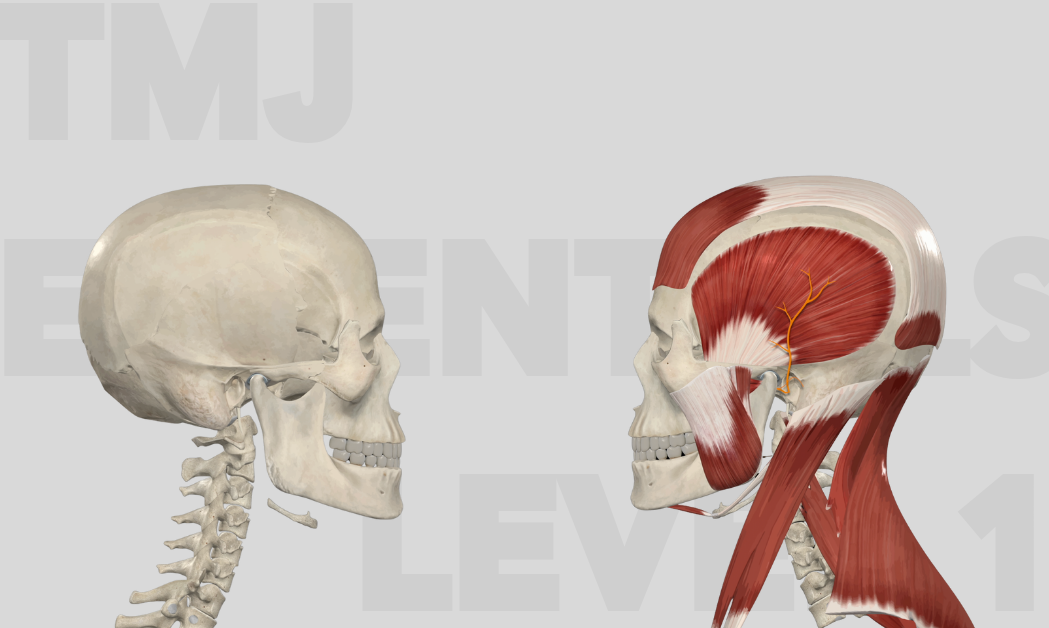Online Course for Dentists
TMJ ESSENTIALS
LEVEL 1
by
TMJ Essentials - Level 1
This introductory course provides a foundational understanding for dentists looking to develop essential skills in managing Temporo-Mandibular Joint (TMJ) Disorders. Tailored for those starting out in the TMD area, participants will be introduced to the fundamental anatomy and function of the TMJ, along with an overview of common dysfunctions.
Through clear, structured lectures and guided case discussions, attendees will learn initial assessment techniques, basic diagnostic approaches, and how to develop straightforward treatment plans.
Topics include understanding occlusal factors, effective communication of findings to patients, and applying conservative management strategies.
By the course's end, participants will have the confidence to begin addressing TMJ issues in their practice, supporting improved patient care from a foundational perspective.
Learning Objectives:
By the end of this course, participants will be able to:
Describe TMJ anatomy and its role in normal mandibular function.
Identify clinical signs of TMJ dysfunction through structured examination.
Differentiate common TMJ-related conditions based on signs and symptoms.
Apply conservative strategies for early-stage TMD management.
Document TMJ findings accurately using clinical terminology.
Communicate TMJ issues effectively to support patient understanding.
Integrate TMJ assessment into routine dental practice efficiently.
Recognize when to treat, monitor, or refer TMJ cases appropriately.
Pre-requisite: None
This level provides a basic understanding of TMJ disorder, including its anatomy, common symptoms, and initial diagnostic approaches.
About the Instructor
Dr. Agatha Bis, DDS – Founder, TMJ Whisperer Academy
With over 30 years of clinical experience, Dr. Agatha Bis focuses on TMJ and TMD management, combining advanced training in occlusion, restorative dentistry, and temporomandibular disorders. Known for her strong diagnostic and treatment skills, Dr. Bis founded TMJ Whisperer Academy to support dental professionals in developing the knowledge and techniques needed to improve patient outcomes in TMD care.
-
The fundamentals of TMJ anatomy and biomechanics
How to identify red flags early during routine exams
Practical screening tools for everyday use
How to communicate effectively with patients about TMJ concerns
The truth about parafunction, occlusion, and joint stress
This is not just theory, you’ll walk away with practical tools you can use immediately.
-
This course is divided into 11 focused chapters, designed to give you a complete and practical understanding of TMJ disorders and how to address them in everyday practice:
Why TMJ Matters in Dentistry
Basic TMJ & Surrounding Anatomy
TMJ Function vs Dysfunction
TMJ & the Body – How TMJ Problems Affect the Rest of the Body
Prevalence of TMD – And Its Impact on Quality of Life
Types of TMD – Classifications & Clinical Presentations
Clinical Examination & Screening
Diagnostic Tools – What to Use, When to Use It, and What You Actually Need
Occlusion & TMJ – Building the Bridge to Advanced Diagnosis
Conservative Management Options
Integrating TMJ Screening into Everyday Dentistry
Each chapter builds on the last, helping you go from foundational knowledge to real clinical implementation.
-
Dentists, new grads, and experienced clinicians who want to:
Expand their diagnostic skills
Improve patient outcomes
Stand out in their practice
Offer a more holistic approach to care
Boost your skills with TMJ Essentials Level 1!
A practical online CE course for general dentists ready to improve patient care.
If you need more details, kindly complete the form or contact us via email at info@tmjwhispereracademy.com




